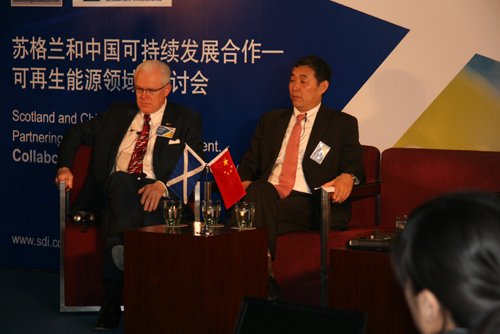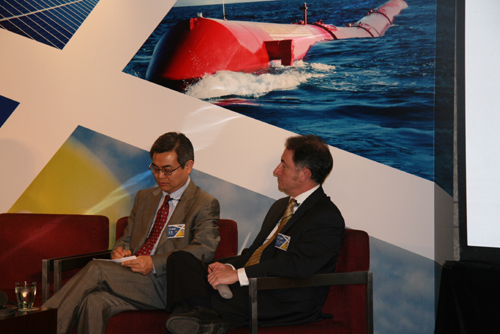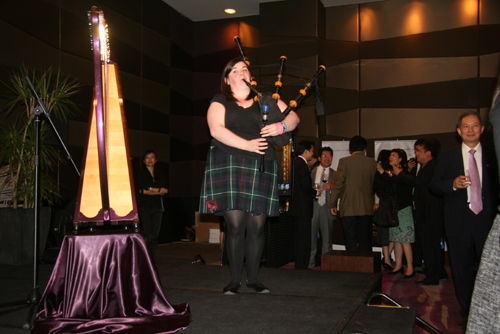By David Ferguson
 |
|
Celtic harpist Katie Targett Adams along with Scotland's First Minister Alex Salmond |
Scotland's First Minister, Alex Salmond of the Scottish National Party, continued a successful visit to China with a set of high-profile events in Beijing on Thursday. Several hundred guests from relevant professional bodies and the media gathered to attend events and seminars promoting Scotland as a partner for China in the fields of education, golf, and top-of-the-range whisky.
But the principal focus of the evening was renewable energy, a field of massive potential for both countries and a field in which both countries have already invested considerable effort. Many westerners will be unaware that China already leads the world in the volume of renewable energy produced, while Scotland is at the leading-edge of technology development in the complementary fields of wave power, tidal power, and on- and offshore wind power.
First Minister Salmond chaired a panel presentation and discussion on the subject. He was supported by Professor Jim Macdonald, principal and vice-chancellor of Strathclyde University, one of Scotland's most prestigious technical universities, Jack Perry, the chief executive of Scottish Enterprise, Li Junfeng, deputy director of energy research at the National Development and Reform Commission (NDRC) – the Chinese government's key economic management body – and Geng Xiao, director of the Brookings-Tsinghua Center for Public Policy at Tsinghua University in Beijing, China's top academic institution.
 |
|
Scotland's First Minister Alex Salmond and Minister of Education Fiona Hyslop on stage with other dignitaries to offer a traditional Chinese 'Ganbei' |
"The renewable energy sector, probably more than any other, offers massive opportunities for our countries to collaborate," said the First Minister. "The potential benefits, domestically and globally, now and in the future, are vast. Our leadership and innovation in renewable energy is helping nations around the world to maximize the potential of their renewable energy sources at a time when governments and the public are becoming more concerned with sustainability and environmental issues."
Mr Salmond went on to emphasize the Scottish Government's commitment to its renewables strategy through the Saltire Prize, a worldwide initiative sponsored by the Government and offering a purse of £10 million (90 million RMB) for advances in marine energy technology to benefit people around the globe. The prize has already attracted almost one hundred entries involving almost as many countries. The challenge set out in the rules of the competition, which will run until December 2014, is as follows:
"The Saltire Prize will be awarded to the team that can demonstrate in Scottish waters a commercially viable wave or tidal energy technology that achieves a minimum electrical output of 100GWh over a continuous 2 year period using only the power of the sea and is judged to be the best overall technology after consideration of cost, environmental sustainability and safety."
 |
|
Jack Perry, Chief Executive of Scottish Enterprise, and Li Junfeng, Deputy Director of Energy Research at the National Development and Reform Commission (NDRC) together on the Renewable Energies panel. |
The First Minister also spoke with enthusiasm about the efforts of SGURR, a small Scottish company that has only been in existence for five years, but is a world leader in the 3-D mapping of wind currents with its proprietary Galion technology. SGURR is a good example of the enterprise and pioneering spirit for which Scotland was once renowned, and is now in the process of establishing itself in China and attacking the huge potential of the Chinese market.
Mr Salmond's introduction was followed by a stimulating and forceful presentation by Professor McDonald. With a wealth of detail he emphasized the determination to keep Scotland at the forefront of renewable energy technology through a combination of academic effort and industrial activity, focusing on the fact that the country holds one quarter of Europe's total wind and marine power potential – a projected capacity of 60 GW of exploitable renewable energy resources by 2025.
 |
|
Geng Xiao, director of the Brookings-Tsinghua Center for Public Policy at Tsinghua University in Beijing, together on the Renewable Energy panel with Professor Jim Macdonald, principal and vice-chancellor of Strathclyde University. |
Elsewhere in the course of the evening Scotland's Minister of Education and Lifelong Learning, Fiona Hyslop, welcomed guests to a reception attended by representatives of many of Scotland's best universities. China is an important source of talent for Scotland's universities, with 5,000 Chinese students already studying there, and Scotland is keen to build on the link. Ms Hyslop emphasized that Scotland and China share a strong tradition of respect for learning, and she spoke to China.org about the establishment of 50 Saltire Scholarships, a bursary of £2,000 available to Chinese post-graduate students provided through matched funding from Scotland's universities and government.
She also announced the signing of a groundbreaking partnership between Shanghai University's College of Digital Arts – the first such dedicated facility in China – and the University of Abertay in Dundee, Scotland's centre of excellence in computer games education, and further committed to underpinning the excellence of academic research in Scottish institutions through a Scotland-China Higher Education Research Partnership for PhD studies which will be launched in 2009.
Scotland is well-known in China as the home of golf, although China too lays claim to having discovered the game even if this knowledge was subsequently lost in the mists of time. But golf is now experiencing a surging renaissance in China, which has become the country with the greatest potential for growth in the game. The sport's popularity is spiraling upwards, and the ranks of its estimated three million players are joined by huge numbers of new converts every year. Enthusiasm for golf in China will certainly match the trend in other developed countries like Japan and Korea, and in absolute terms China clearly has numbers that vastly exceed these two powerhouses of the Asian game.
A previous initiative to popularize Scotland as the destination of choice for China's golfing tourists was launched in Shanghai in 2006 with a considerable fanfare by a kilted Jack MacConnell, the Labor Party predecessor to Mr Salmond as Scotland's First Minister.
A contemporary item on the Scottish government website announced Mr McConnell's words: "The whole world is trying to target the massive Chinese tourism market that is opening up. New figures show that Chinese tourism could be worth around £70 million to Scotland over the next four years..." Unfortunately, the project seems to have faltered with little trace of any discernible results, as is often the case with such government-led initiatives. This is a great pity given the potential importance of golf tourism to the Scottish economy, which at the time was already worth £300 million per annum. Perhaps a new government with a greater focus on Scotland's own needs will make more of a real impact.
|

|
|
The formidable Lady Piper Zoey Maciver pipes Scotland's First Minister Alex Salmond into the evening reception. |
Following the formal seminars and discussions the guests were provided with refreshments, and samples of some of Scotland's finest whiskies were offered for tasting. First Minister Salmond was piped into the reception by Zoey Maciver, a lady piper of formidable accomplishments who lives and works in Beijing.
Further entertainment was provided by Celtic harpist Katie Targett Adams, a Scot who also lives and works in China. Katie speaks Chinese, and she writes and sings in both English and Chinese. She sang Xin de wei lai, a ballad she has written to commemorate the Sichuan earthquake which struck the south of China almost a year ago, and which Katie hopes to promote to help raise further funds for the victims and the survivors.
(China.org.cn April 10, 2009)